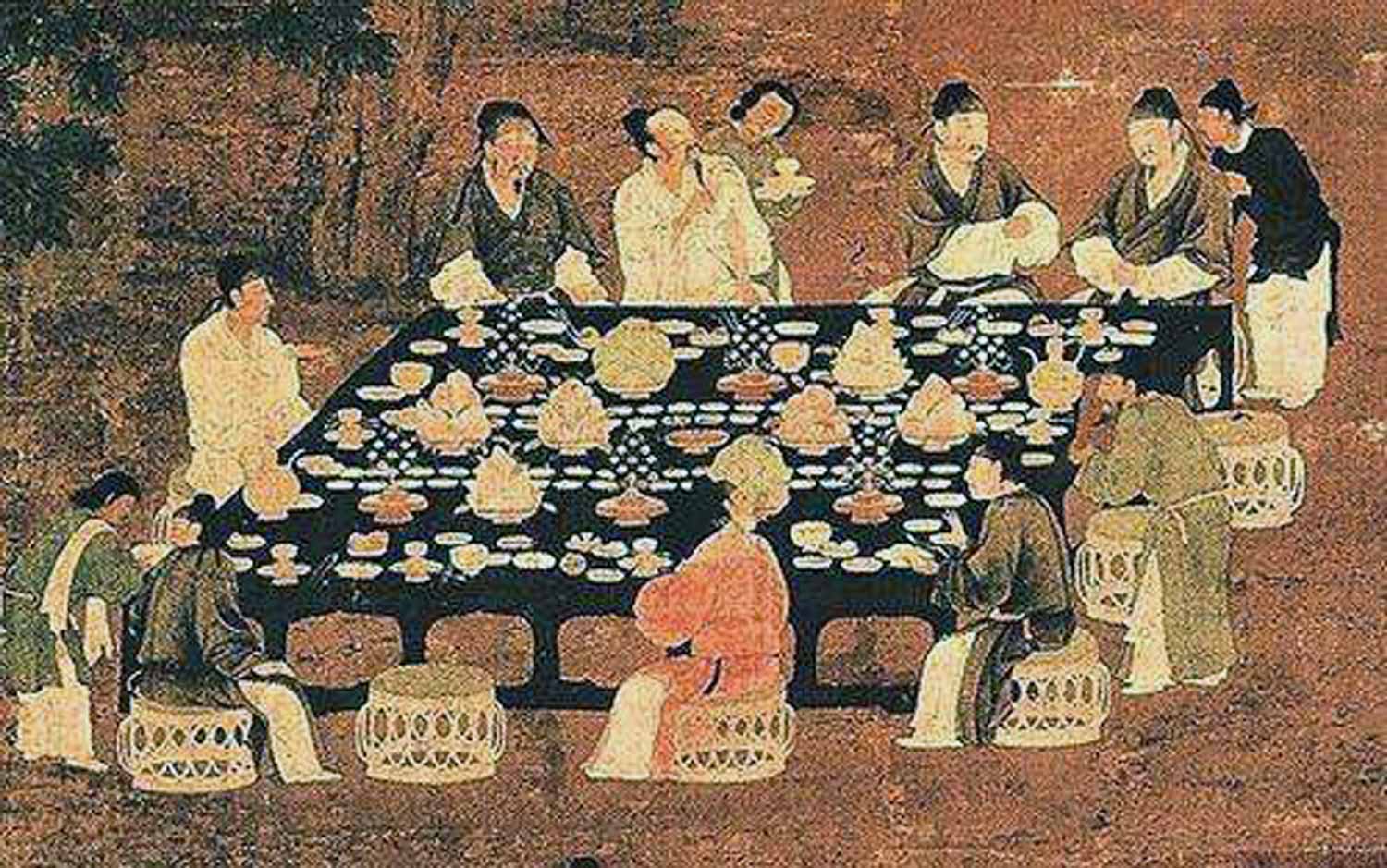|
T of C
Home |
My Work |
Hand- books |
Qin as Object |
Qin in Art |
Poetry / Song |
Hear, Watch |
Play Qin |
Analysis | History |
Ideo- logy |
Miscel- lanea |
More Info |
Personal | email me search me |
| Qin biographies | 首頁 |
|
Transcendent Group of 10 Friends
An informal grouping of ten famous Tang literati |
仙宗十友 1
Xian Zong Shi You |
| Does this painting show the ten friends?2 (expand) |
 The Xianzong Shiyou were ten poets more or less associated around 700 CE; Sima Chengzheng (see #1) was more or less at the center. Their connection is mentioned in QSDQ, Folio 17, #41.
The Xianzong Shiyou were ten poets more or less associated around 700 CE; Sima Chengzheng (see #1) was more or less at the center. Their connection is mentioned in QSDQ, Folio 17, #41.
- 司馬承正 Sima Chengzheng (647 - 735)
- 李白 Li Bai (ca 705 - 762)
- 孟浩然 Meng Haoran (689 - 740)3
- 王維 Wang Wei (701 - 761)
- 陸藏用 Lu Cangyong (ca. 660 - ca. 714)
- 陳子昂 Chen Zi'ang (661 - 702; Wiki)
Chen Zi'ang (42618.40), according to ICTCL, p.236, "was among the first poets in the Tang dynasty to openly express discontent over the effeteness of contemporary poetry and to advocate a return to the seriousness of of the Han-Wei style." Ibid, p.237 says, "His poetic reputation rests mainly on his cycle of thirty-eight poems entitled "Gan-yu" 感遇 (Stirred by My Experiences)" (see in Chinese Wiki). A friend of Lu Cangyong and Zhao Yuan, he has several connections to the qin. Some say he wrote 平沙落雁 Pingsha Luo Yan. A story about him and a qin is told in QSDQ, Folio 17, #50, but it may concern a huqin fiddle.- 宋之問 Song Zhiwen (d. 712; ICTCL p.677)
See Yao Tian Sheng He, Shen Quanqi, a poem and lyrics for Lüzhu Yin- 王適 Wang Shi 4
Wang Shi (21295.1691), from 幽州 You Zhou, achieved the official rank of 司功參軍 Personnel Manager in Administration.- 畢構 Bi Gou 5
Bi Gou (22349.11; Bio/516), style name 產擇 Chanzhai (or Chenze), was from 偃師 Yanshi.- 賀知章 He Zhizhang (659 - 744)
He Zhizhang (37569.42 has a picture; Bio/1813), style name 季真 Jizhen, was from 越州永興 Yongxing in Yuezhou (Zhejiang province). He gave himself the nicknames 四明狂客 Siming Kuangke and 秘書外監 Mishu Waijian. Du Fu named him one of the "Eight Immortals of the Winecup". Further information is available online. (See, e.g., some translated poems).
Footnotes (Shorthand references are explained on a
separate page)
1.
仙宗十友 Xianzong Shiyou
1/xxx; 391.81 仙宗十友 refers to 海錄碎事,人事,朋友 then simply lists them as Sima Chengzhen and the others, adding 出本傳. No translations for xianzong, which literally means something like Transcendent Sect. (Compare: 孔門十哲 Ten wise disciples of Confucius)
(Return)
2.
Image: Painting of the ten friends?
This image was copied from
new.qq.com. The text mainly concerns Song Zhiwen and it includes a number of images, but I could find no information at all about any of the painters or about the source/details of any of the paintings. It could thus simply be a coincidence that there are ten literati sitting at the table.
(Return)
3.
孟浩然 Meng Haoran (689 - 740)
Meng Haoran (Bio/1616, ICTCL,
Wiki, etc.) was one of China's most noted poets. A native of
Xiangyang, he spent most of his life in the mountains near the city and wrote extensively about them. Ronald Egan, Controversy, p.53, says "Meng Haoran and Li Bo further promoted the cultivation of a special literati affiliation with (the qin)." Relevant references include:
- An online translation of Thinking of Xin in South Pavilion on a Summer's Day (mentions the qin)
- QSDQ, Folio 19B, #30 (seems to be the only Meng Haoran poem in QSDQ)
- His Poem Presented to Cen Liao the Daoist (refers to qin studs)
- A poem referenced under Song of a Fisherman
- In Summer at the South Pavilion, one of the 300 Tang Poems
- At the Mountain Lodge of the Buddhist Priest Ye Waiting in Vain for my Friend Ding, another of the 300 Tang Poems
The two poems by 孟浩然 Meng Haoran from the 300 Tang Poems are as follows:
散發乘夕涼,開軒臥閒敞。
荷風送香氣,竹露滴清響。
欲取鳴琴彈,恨無知音賞。 (Wishing to fetch my qin and play, regretting no close friend to appreciate it.)
感此懷故人,中宵勞夢想。
The translations by Witter Binner are readily available online; for these two see, e.g., here and
here (both mis-translate qin as lute).
(Return)
4.
Wang Shi (?)
王適 could also be pronounced "Wang Kuo" but the few English language references I have found have "Wang Shi". Bio/113 王適 mentions only a person of the same name in the Ming dynasty. The following is a poem by him that mentions qin (see line 4).
今年芳樹枝,孤棲怨別離。
珠簾晝不捲,羅幔曉長垂。
苦調琴先覺,愁容鏡獨知。
頻年雁度無消息,罷却鴛文何用織。
夜還羅帳空有情,春著裙腰自無力。
青軒桃李落紛紛,紫庭蘭蕙日氛氳。
已能顦顇今如此,更復含情一待君。
Not yet translated.
(Return)
Return to Biographies, or to the Guqin ToC.